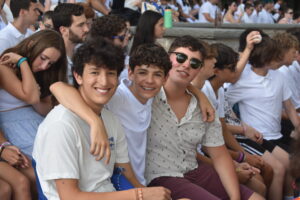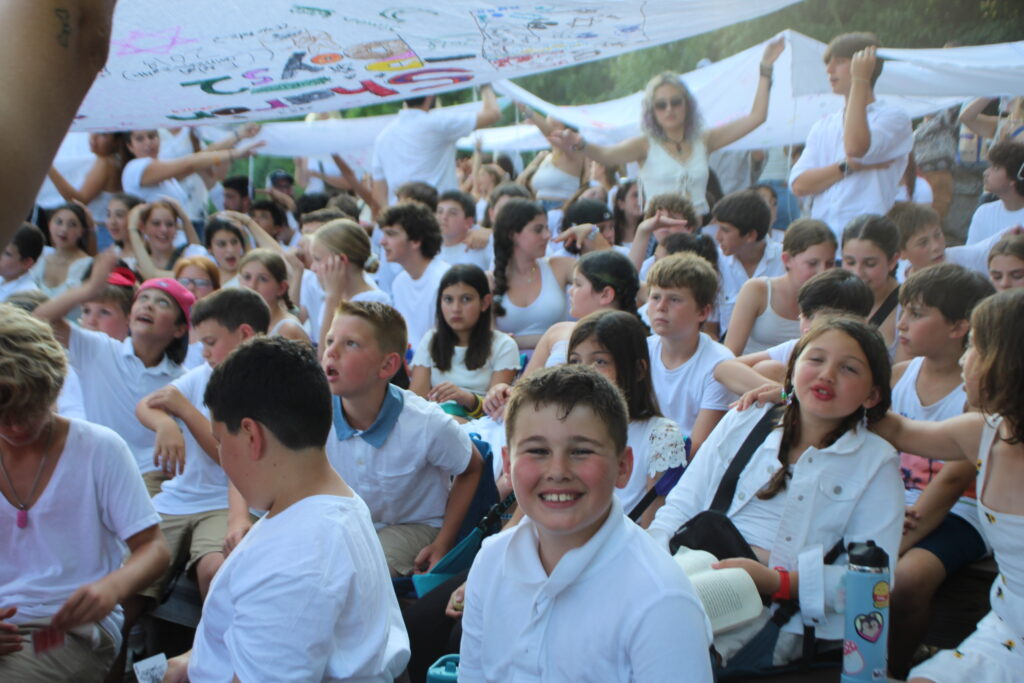 Shabbat Readings and Remarks from Kineret and K’far Noar Campers and Manager of New Family Engagement and Community Outreach Rachel Steinberg – July 21st and 22nd
Shabbat Readings and Remarks from Kineret and K’far Noar Campers and Manager of New Family Engagement and Community Outreach Rachel Steinberg – July 21st and 22nd
Kineret’s Friday Night Service
Talia, Sydney, Olive, Wren
Talia – This Shabbat service is about finding joy. We find joy during nikayon sometimes your job is hard and it feels like you will never finish in time. When your friends help even though they don’t have to, it brings us joy.
Sydney – During nikayon I still had to make my bed, clean my area, and do my job. I felt really stressed and overwhelmed. When my friend came over and offered to do my job it felt like a heavy weight was lifted off my shoulders. I found joy because my friend chose to help me when I needed it.
Olive – I had showers one day for nikayon. We had not cleaned the showers the day before so they were extra gross. My friend saw me struggling and came over while we did the job we were talking, laughing, and having fun! I found joy doing something that felt miserable at first.
Wren – We learned while writing this speech joy is everywhere, even if it’s hard to find. We found joy when others did kind deeds. So remember little things can make an impact on people!
Liv, Layla, Dani, Piper
Dani – The Ma’ariv Aravim is a prayer about the creation of day and night.
Layla – Day and night is important to us because if we have a few messups or mistakes we know we will have a better tomorrow.
Piper – Once I had a big fight with my friend and we had made up the next day we had all night to think about it. I was grateful that we were able to talk about it in the morning.
Liv – I find joy in the night because I’m able to digest and think about what I did that day and what I can do better tomorrow.
Dani – You should always find joy in what you are doing and what you will do tomorrow because we are so lucky to wake up each day and have new opportunities. So you should live life to the fullest.
Lev, Ethan, Micah, Louis
Lev – Our Middot this week is Simcha finding joy. The Shema means to listen up to God. Our Counselors always say: if we listen our summer will be better. If you listen when you need to you will be able to find joy.
Ethan – The Shema means to me, to rise up and listen to the prayer when I’m using a fidget I always stop and listen up.
Micah – its important to find joy especially at camp. Part of that is listening to other people if we don’t listen to others nothing fun can happen. The shema gives us a chance to listen and find joy.
Louis– To me the shema means listening. At the chapel on the hill there is no echo like the chapel in the woods. That means that we really need to listen to God and the prayers. Rise or sit according to your custom for the Shema
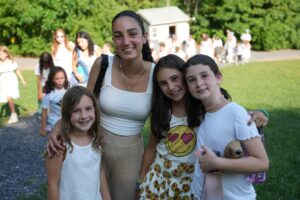
JG, Jacob K, Ben, Jacob B, Elliot
We were in Carmel together.
JG – When we first met we were strangers
JK – But we were able to create a community, a strong one.
Elliot – I joined in Sharon
Jacob B – I joined Kineret this year. They welcomed us into their community.
Ben – Now we are all one big K4 family.
JG – During the Hashkiveinu, we come together as a bunk to be sheltered in peace together under our tallit.
Ben – Just like our K4 community protects us, the Hashkeveinu also offers a moment of safety.
Rebecca, Izzie, Harley, and Eliza
Harley – Before I got to camp, I was nervous and excited to see my old friends. When I got to camp, all of my nervousness was washed away when I was greeted with warm hugs and smiles.
Izzie – I realized these are the people that bring me the most joy and happiness no matter what happens throughout the time we have together.
Rebecca – I believe everyone can find joy at camp whether at song session or during Bunko.
Eliza – This week, leading up to Shabbat, got me thinking about the importance of finding joy. And I realized that joy can be found with anyone anywhere.
Together – We can find joy at camp and so can you.
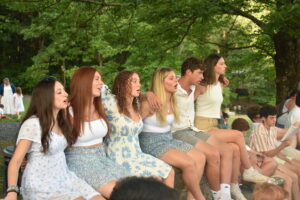
Lilah, Naya, Rosie, Juliet, Mia, Naomi
Mia – This week’s middah is Simcha, which means finding joy.
Naya – For me, simcha was when I first reunited with my camp friends and threw tape at them.
Naomi – I find joy at camp in getting a 10 in Nikayon regardless of all the junk shoved under the beds.
Lilah – At camp I find joy swimming in the lake with my friends and collecting enough algae to make a yacht and sail the seven seas.
Rosie – I experience simcha when I’m on the high platform of the zipline and look down and begin to regret my life decisions.
Juliet – Even though my friends disagree, I find joy at milk squad soaking my cookies in milk for exactly 2 minutes 31 seconds to get the perfect amount of sogginess.
Mia – This Shabbat we challenge you to find Simcha in your own way.
Juliet, Naomi – Whether it be playing a card game…
Lilah, Naya – … or pondering the meaning of life.
All – We hope you experience simcha in the weeks to come
Ellie, Sophie, Sammy, and Rebecca
Rebecca – This Shabbat’s middah is Simcha, finding joy.
Sophie – Finding joy means seeking happiness whether youre hanging out with friends or reflecting during the silent prayer.
Ellie – We all know that finding joy is important and that is because it is something that everyone needs and something that makes the day better.
Sammy – The silent prayer is the calmness of the service. Some people find joy with their surroundings being silent and calm.
Rebecca – There are many ways to find joy, but one way I find joy is swimming in the lake with friends.
Sophie – I find joy by spending time with my family and friends.
Ellie – I find joy by chilling in the bunk with my friends.
Sammy – I find joy by hanging out with my friends.
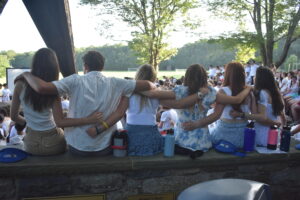
D’Var Torah from Rachel Steinberg, Manager of New Family Engagement and Community Outreach
Shabbat Shalom!
As you may know, at the core of everything that we do here at Harlam
is grounded in the middot. And as you also may know, middot are
measures. Just like we work to repair the world (tikkun olam) through
our actions, we also work to improve ourselves through building and
strengthening desirable character traits (tikkun middot). While you are
here at camp our hope is that each of you will become the best version
of yourself and to do that, we encourage you to build and strengthen
your character and more specifically through the middot, in a Jewish
context.
Many years ago, a group of stakeholders, leaders who care a lot about
camp, came together to discuss and ultimately, decide on the middot
that we wanted to nurture in our campers, CITs and staff. Among those
was Simcha, Joy. For many of us, camp is so much about joy – finding
joy in big and small things, finding joy for ourselves, and finding joy
together. The campers and staff from Kineret have already shared some
of the many ways in which they find joy at camp and hopefully, this will
inspire you to do the same.
I have spent almost every summer of my life (and trust me, that’s a lot
of summers) at camp and not just here at Harlam. And despite many
tears of sadness over those years, whether from missing home, a color
war loss, a disagreement with a friend or any other number of things, I
mostly reflect on my summers with tremendous joy including lots of
tears of joy (my favorite kind of tears!). I found joy as a camper at day
camp and overnight camp, as a counselor and unit head, and for more
than 20 years as a full-time camp professional. Each summer there is
joy in the small moments and the big ones, joy I find for myself and the
joy I see in others. And it’s this joy – both in the smiles and the tears –
that inspires me to return summer after summer to camp, where I too
continue to build and strengthen my character, both personally and
professionally, to be the best version of myself.
In the words of the late Rabbi Lord Jonathan Sacks: I think of Judaism as
an ode to joy. Like Beethoven, Jews have known suffering, isolation,
hardship and rejection, yet they never lacked the religious courage to
rejoice. A people that can know insecurity and still feel joy is one that
can never be defeated, for its spirit can never be broken nor its hope
destroyed.
I wanted to share one more quote in closing: “Happiness isn’t a place
you get to. It’s a thing you bring with you every step of the way.” My
hope for you as you leave the gates of Camp Harlam, for some of you
that will be in a couple of days and others of you in a couple of weeks,
is that you bring the Simcha, the Joy, with you to inspire yourself and
others wherever your journey may take you.
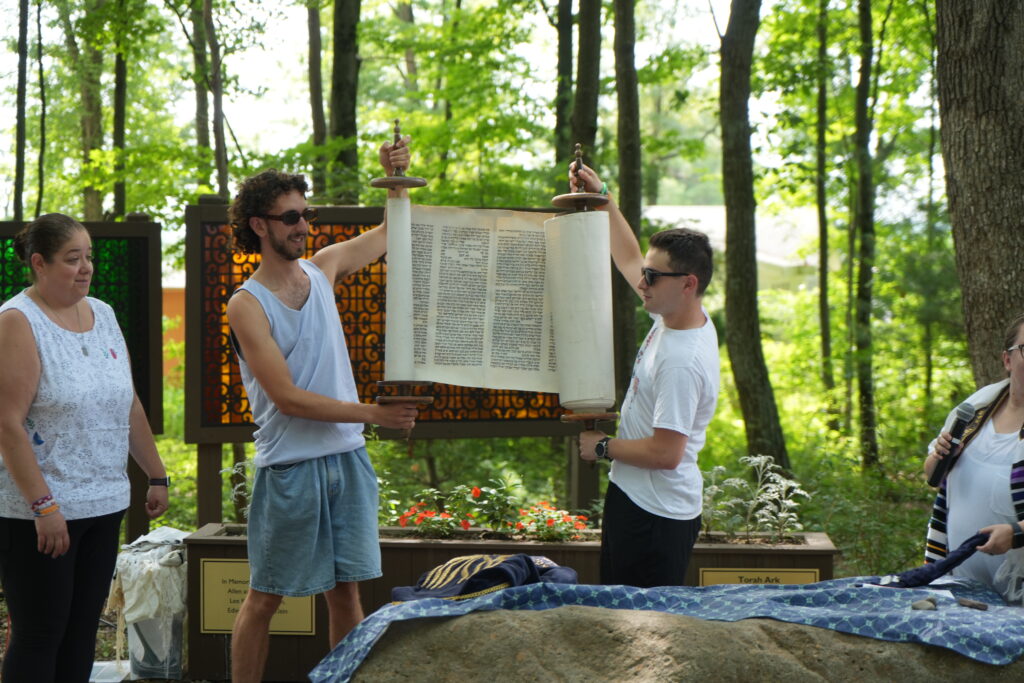
K’far Noar’s Saturday Morning Service
Amy, Ava, and Luci
All – Shabbat Shalom
Amy – One word to sum up this summer is CHANGE. As campers in senior camp, we are constantly evolving
Ava – We now have to eat breakfast in the old Ulam instead of the Chadar and eat cold food.
Luci – We also have a long walk back to the village which can be annoying after long days in the sun. The showers are cold and the bunks are old.
Amy – Despite these changes and challenges, we have found that we have come out closer than ever.
Ava – One constant through all of it is each other. We have stuck together with positive attitudes.
Luci – We have found that these challenges are opportunities to make new memories
Amy – Like singing Taylor Swift on the way to the village, chanting the motzi as loud as possible to get food, or laughing in the showers together.
Ava – Making these memories has overshadowed the challenges and negativity.
Luci – So embrace every moment at camp, even the not so great ones because you never know what could come out of it.
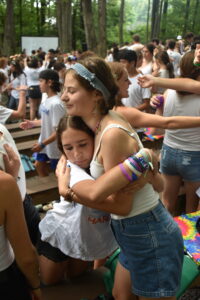
Lily and Devin
Lily – The mi chamocha is about the Israelites pushing through a challenge to start a new life. As the red sea parted, the Israelites worried about the new life ahead of them but knew they could push through it together. Our middah, Nitzachon, means pushing through a challenge.
Devin – Every camper at Harlam pushes through a challenge; whether it’s coming to camp for the first time, living in a new space, or meeting new campers and counselors. No matter how long you have been coming to camp, the community we have here will always support one another through challenges.
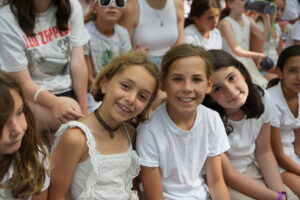
Avery and Tyler
Avery – No matter how many years we go double session, the transition between first and second remains difficult.
Tyler – Having to adjust to new bunks and new people while staying in the same place can make it easy to forget why we love it here.
Avery – Through keeping a positive attitude and being there for each other, we are able to overcome these challenges and make the most of the little time we have together.
Tyler – We find the magic of camp by pushing through these challenges and being grateful for every moment.
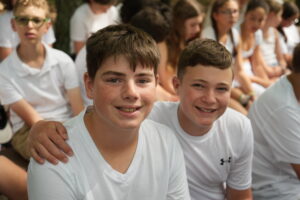
Abby and Sydnie
Sydnie – Imagine starting your first summer at camp Harlam unsure of the community and overall feeling of what camp means.
Abby – Everyone has felt this feeling at one point
Sydnie – For example, I know I definitely felt this because a while ago it was my first summer. I knew no one and was kind of on my own.
Abby – Camp Harlam is known for the phrase “welcome home” and knowing that, I welcomed Sydnie in with open arms.
Sydnie – This year both Abby and I pushed through a new challenge by joining a youth group called BBYO.
Abby – Both of us knew not many members but walked into the first event with an open mind.
Sydnie – Because of that we met so many new people and have a better understanding of our Jewish identities.
Abby – Over this Shabbat we hope that you can think about the things that we spoke about and use them as tools to push through your next challenge.
Sophia, Liza, and Ayla
Liza – Yotzer Or is a prayer about light and darkness. During camp there are many hardships we face such as when your first session best friends leave, drama, and those days when you just miss your family.
Ayla – After the dark there is always light in which Yotzer Or reminds us of that miracle. At Camp Harlam, there are many light moments such as; screaming our hearts out during song sessions, deep conversations in the center room, and morning walks. Year after year this is the light that draws us back to our home away from home.
Sophia – These challenges are difficult, but with your best friends by your side, they help bring out the light in every moment. Please join us for the Yotzer Or and reflect on all the challenges that camp has helped us overcome.
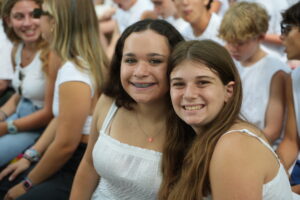
Tracy and Mel
Tracy: Shabbat comes and goes every week without fail.
Mel: But what does Shabbat really mean to us?
Tracy: Connection
Mel: peacefulness
Tracy: spirituality
Mel: faith
Tracy: appreciation
Mel: As counselors, we look at our campers and see them take in Shabbat the same way we used to.
Tracy: when we were campers, these songs and prayers were just something we would sing, sometimes not knowing what they meant and why we were saying them.
Mel: Now having a different perspective of what Shabbat really means, we talked to our campers to show them how important and meaningful Shabbat is every week.
Tracy: As my final Shabbat concludes and I get ready to go back to school at the end of this week, I reflected on what Shabbat at camp has given to me. Shabbat at camp has allowed me to have the opportunities to be comfortable to pray and embrace Judaism in many different ways.
Mel: Being with this unit for the second year now, I have seen them grow and see the spirit of Shabbat continue on with them. Although I might not be able to have more shabbats with them next year, I know that their meaning of Shabbat will continue to expand.
Tracy: We invite you all to think about what Shabbat at camp means to you.
Shabbat ShaRaps
Moses was a Jew just like you
Pleading to God please let me come through
He said follow the laws cuz you know they’re true
Or God will come down and make you feel blue
Moses told the people you have to be honest
Keep praying to to God and wear your Tallis
Listen to the shema it’s the Jewish creed
And following it is your solemn deed
After walking through the desert for many many years
Moses wasn’t let through so the people cried tears
They were going to Israel despite their fears
And they were listening to Moses with with open ears
Moses taught the people everything he knew
So the Israelites knew just what to do
Now the people are trying to figure out
What their new Jewish life will be all about
And what it will be like to be without
Moses who them down the right route
So they pushed through a challenge that’s nitzachon
And went on to form our Jewish home
Follow the word of God, don’t pop your lid
And always remember, GOD DID!
